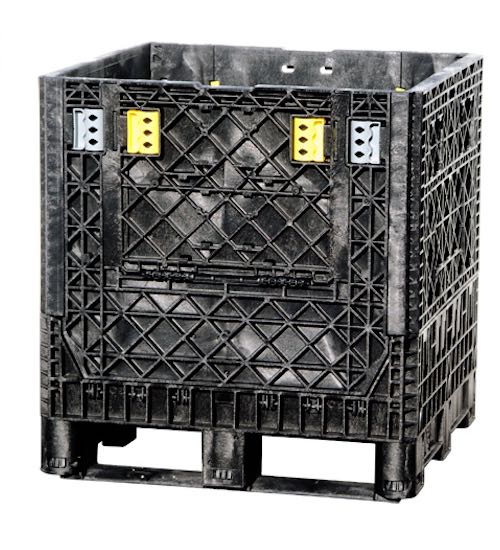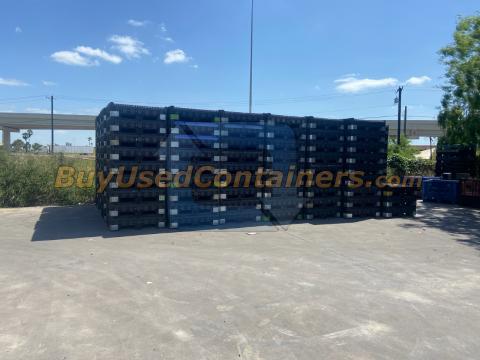Maximize your warehouse space with used collapsible bulk containers for organized handling
Why Mass Containers Are Important for Sustainable and Economical Transport
Bulk containers play an essential function in modern logistics. They help with the reliable movement of huge quantities of products, thereby enhancing transport processes. This method not only lowers prices but also minimizes ecological impact via reduced discharges and waste generation. As sectors seek more lasting practices, the fostering of bulk containers is coming to be increasingly considerable. What implications does this change hold for future logistics and supply chain management?

The Advantages of Using Mass Containers in Logistics
Bulk containers reinvent logistics by enhancing performance and sustainability. These containers enable the transportation of large quantities of products in a single trip, considerably decreasing the variety of journeys needed. This not just enhances procedures yet likewise reduces labor costs related to handling, filling, and dumping. Furthermore, mass containers are created to optimize room application within transport vehicles, guaranteeing that more products can be shipped simultaneously.
The standardization of mass containers likewise streamlines the logistics process. With uniform measurements, they can be quickly stacked and stored, bring about boosted storehouse monitoring. Bulk containers frequently feature durable materials that safeguard components from damage throughout transportation, consequently reducing product loss and enhancing overall reliability. Because of this, organizations can experience enhanced supply chain performance, ultimately leading to raised productivity and consumer satisfaction. This mix of aspects makes bulk containers an essential possession in contemporary logistics.
Environmental Effect: Minimizing Waste and Carbon Footprint
As markets progressively prioritize sustainability, the fostering of bulk containers has become an essential approach for lowering waste and decreasing carbon footprints. These containers reduce the usage of packaging materials, such as boxes and plastic, consequently especially lowering overall waste generation. By combining shipments, bulk containers boost transport performance, enabling even more products to be delivered per trip. This decrease in trips directly associates with lower greenhouse gas emissions, adding to a smaller carbon impact.
Mass containers can commonly be reused or reused, further minimizing environmental influence. The toughness of these containers warranties they can withstand several transportation cycles, lowering the demand for single-use options. refurbished bulk containers. By enhancing logistics and advertising effective resource use, mass containers not only sustain sustainable methods but likewise urge sectors to line up with global environmental goals. Inevitably, their application shows a commitment to ecological stewardship and accountable source monitoring
Price Financial Savings: How Mass Containers Lower Transport Expenditures
While numerous companies look for methods to improve their bottom line, using bulk containers offers a significant opportunity for lowering transportation expenditures. Bulk containers make the most of the quantity of products transported, permitting services to deliver larger quantities at when. This efficiency reduces the variety of trips needed, directly reducing fuel expenses and decreasing labor expenses connected with loading and unloading.
Furthermore, mass containers frequently include streamlined layouts that optimize area application within transport lorries. This indicates fewer voids, leading to a lot more reliable use available ability. The longevity of mass containers can decrease the risk of product damage throughout transit, making sure and reducing losses that even more products show up undamaged.
Enhancing Supply Chain Effectiveness With Mass Storage Solutions
Mass storage options play an important function in enhancing supply chain effectiveness by maximizing supply management. By combining products right into fewer, bigger containers, companies can substantially lower handling expenses connected with constant transfers and processing. This structured method enables better tracking and management of supply, eventually causing boosted functional performance.
Streamlined Supply Monitoring
Reliable stock administration is necessary for optimizing supply chain procedures, particularly when companies take on bulk storage solutions. These remedies enable organizations to maintain higher stock levels while minimizing the frequency of replenishment. By combining products right into bulk containers, firms can enhance their supply procedures, minimizing the complexity connected with tracking several smaller plans. This approach promotes exact inventory counts and improves forecasting precision, enabling more enlightened decision-making. On top of that, mass storage space remedies streamline warehouse company, making it easier to situate and gain access to items when needed. Consequently, organizations can accomplish an extra efficient inventory turn over price, eventually improving overall supply chain performance and minimizing the chance of stockouts or overstock scenarios.

Reduced Handling Costs
The application of bulk storage space remedies not only simplifies supply monitoring but also considerably decreases managing prices throughout the supply chain. By consolidating products right into bulk containers, firms reduce the requirement for frequent handling and transfer between different storage and transportation units. This method cuts down on labor expenses connected with loading, discharging, and relocating smaller sized packages. In addition, bulk storage reduces the regularity of deliveries, resulting in reduced transportation expenses and decreased gas intake. Therefore, services can optimize their logistics procedures, permitting a more reliable allocation of sources. Eventually, minimized handling costs add to improved total supply chain effectiveness, promoting an environment that supports both sustainability and financial stability.

Convenience of Mass Containers Across Numerous Industries
Although numerous markets have distinctive requirements for transportation and storage, bulk containers have actually emerged as a functional option that fulfills a large array of requirements. These containers, ranging from big bins to specialized tanks, can fit varied materials, consisting of granules, liquids, and powders. In the farming industry, mass containers promote the transport of plant foods and grains, while the food and beverage market utilizes them for ingredients and ended up items. The chemical industry counts on mass containers for safely transporting dangerous materials, ensuring compliance with safety policies. Furthermore, building companies benefit from bulk containers for carrying aggregates and various other materials. Their flexibility includes different settings of transportation, consisting of ships, trucks, and trains, enhancing logistical efficiency. This flexibility not only simplifies operations across various fields yet additionally advertises sustainability by decreasing packaging waste and maximizing room en route. For that reason, mass containers play an essential duty in modern supply chain monitoring.
Future Patterns wholesale Container Usage and Sustainability
The future of mass container use is increasingly shaped by innovative products development that enhances sustainability. In addition, automation in logistics promises to improve procedures, minimizing waste and enhancing effectiveness. Welcoming round economy practices will certainly additionally transform how bulk containers are developed, utilized, and reused, cultivating a much more sustainable transportation landscape.
Innovative Materials Advancement
As sectors significantly focus on sustainability, cutting-edge products development in bulk containers becomes a considerable variable in enhancing eco-friendly transport services. Scientists and manufacturers are discovering eco-friendly plastics, recycled composites, and light-weight steels to reduce environmental influence. These materials not only decrease waste yet additionally boost fuel performance by decreasing the general weight of containers. Additionally, developments in smart materials, which can adapt to varying conditions, improve the durability and performance of mass containers. The combination of these cutting-edge materials lines up with circular economic situation concepts, advertising reuse and recycling. As the need for sustainable techniques expands, the development of such products will certainly play an essential duty fit the future of mass container usage in logistics and transport.
Automation in Logistics
Significant advancements in automation are positioned to change logistics and the application of bulk containers, improving sustainability in transportation. Automated systems, including drones and autonomous cars, are improving the motion of mass containers, decreasing the reliance on typical fuel-powered transportation. These modern technologies enhance transmitting and filling procedures, reducing vacant miles and improving gas effectiveness. Additionally, automated stock management systems enhance monitoring and monitoring of bulk containers, ensuring much better source allotment and decreased waste. The integration of the Web of Points (IoT) enables real-time data analysis, enabling positive decision-making that lines up with sustainability objectives. As automation continues to develop, it is expected to drive further innovations in mass container use, inevitably supporting more sustainable logistics techniques and decreasing the environmental influence of transportation.
Circular Economy Practices
Improvements in automation are setting the phase for an extra integrated strategy to round economic climate techniques in the domain of bulk container use. As markets increasingly embrace sustainability, mass containers are being made for durability and reusability. This shift not just minimizes waste yet likewise improves source effectiveness. Business are taking on approaches such as closed-loop systems, where used containers are collected, reconditioned, and reintroduced right into the supply chain. Furthermore, clever technologies track container life process, promoting far better monitoring and reducing ecological effect. The cooperation in between suppliers, logistics service providers, and end-users is vital in developing requirements for sustainable container use. used collapsible containers. Future patterns show an expanding emphasis on products that are naturally degradable and recyclable, further enhancing the circular economy's concepts in mass transport

Often Asked Concerns
What Products Are Bulk Containers Typically Made From?
Mass containers are generally constructed from sturdy materials such as high-density polyethylene, cardboard, steel, and light weight aluminum. These materials supply flexibility, protection, and stamina, making them appropriate for delivering different items in different sectors successfully.
How Do I Select the Right Size Mass Container?
Picking the ideal dimension mass container entails assessing the volume of materials to be transferred, thinking about handling devices compatibility, and evaluating storage area requirements. Appropriate size warranties effectiveness in transportation and lessens waste during delivery.
Are Bulk Containers Reusable or Recyclable?
Mass containers are frequently multiple-use, made for several trips, enhancing sustainability. Several can additionally be recycled, relying on the materials used. Choosing recyclable choices better decreases and sustains ecological goals waste in transportation techniques.
What Security Regulations Put On Mass Container Transportation?
Security regulations for mass container transportation consist of compliance with the Department of Transport standards, appropriate labeling of hazardous materials, architectural stability assessments, and adherence to weight limitations to assure secure handling and stop crashes throughout transit.
Exactly How Can Organizations Transition to Utilizing Mass Containers Successfully?
Companies can change to bulk containers by examining current logistics, educating team on handling, investing in ideal equipment, enhancing supply management, and collaborating with vendors to ensure compatibility and effectiveness throughout the supply chain.
As industries significantly prioritize sustainability, the fostering of bulk containers has actually arised as a vital strategy for lowering waste refurbished bulk containers and lowering carbon footprints. By consolidating materials into mass containers, business can improve their stock procedures, reducing the intricacy associated with tracking numerous smaller plans. As sectors progressively focus on sustainability, ingenious products growth in bulk containers emerges as a significant aspect in improving environmentally friendly transportation remedies. Automated systems, consisting of drones and self-governing cars, are enhancing the activity of mass containers, lowering the dependence on conventional fuel-powered transport. In addition, automated supply management systems enhance monitoring and tracking of bulk containers, making sure far better resource allocation and reduced waste.